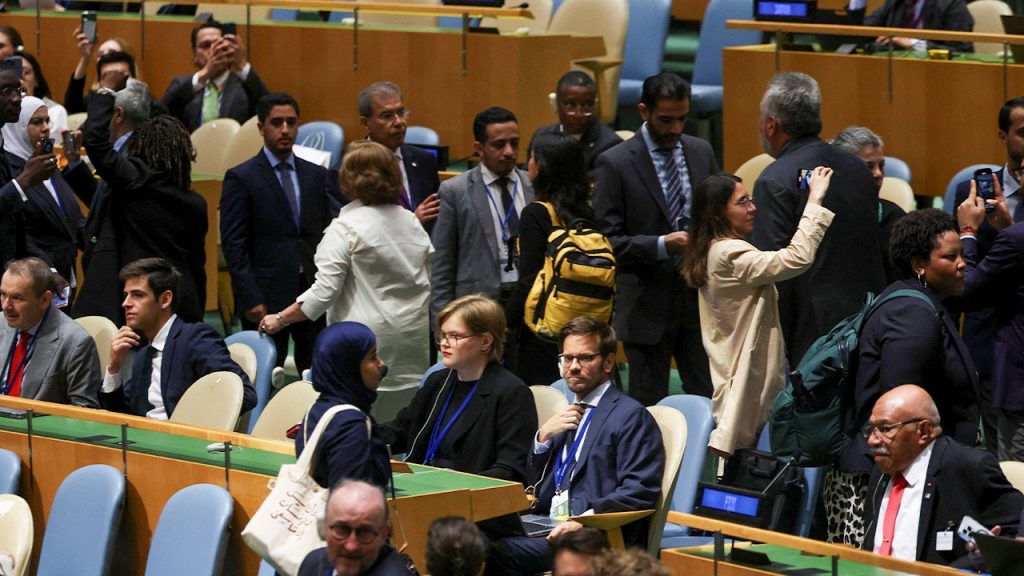Netanyahu Addresses Nearly Empty UN Hall as Delegates Stage Mass Walkout
In a striking display of international politics at the United Nations General Assembly (UNGA), Israeli Prime Minister Benjamin Netanyahu faced a chamber of empty seats on Friday as numerous delegates staged a coordinated walkout just as he prepared to speak. This dramatic response came after days of intense discussions about the Gaza conflict and potential paths to peace in the nearly two-year war. The contrast couldn’t have been more pronounced compared to the day before, when Palestinian Authority President Mahmoud Abbas received extended applause during his virtual address to the same international body.
The symbolism of the moment was impossible to ignore – Netanyahu, leader of a nation at war, standing before vacant chairs in one of the world’s most significant diplomatic forums. While U.S. delegates remained present, the hall was notably sparse. Yet Netanyahu appeared unfazed, revealing a strategic communication plan that transcended the physical audience before him. In a surprising twist, he announced that his speech was being broadcast via loudspeakers surrounding the Gaza Strip and streamed directly to cell phones within Gaza itself, effectively bypassing the diplomatic snub to speak directly to those most affected by the conflict. This tactical pivot transformed what could have been seen as a diplomatic embarrassment into a direct channel of communication with both Israeli hostages and their Hamas captors.
Speaking first in Hebrew and then in English, Netanyahu delivered an emotional message to Israeli hostages: “Our brave heroes, this is Prime Minister Netanyahu speaking to you live from the United Nations. We have not forgotten you, not even for a second. The people of Israel are with you. We will not falter, and we will not rest until we bring all of you home.” He then pivoted to address Hamas leaders directly, issuing both a demand and a warning regarding the 48 remaining hostages: “Free the hostages now! If you do, you will live. If you don’t, Israel will hunt you down.” The directness of this threat, delivered from the UN podium typically reserved for diplomatic language, underscored the extraordinary tension of the moment and Israel’s determination to recover its citizens.
The walkout represented the culmination of growing international frustration with Israel’s military operations in Gaza, which have resulted in significant civilian casualties and humanitarian concerns. Just a day earlier, Abbas had delivered a passionate address where he condemned what he termed Israel’s “genocide” in Gaza and asserted the Palestinian Authority’s readiness to assume security and governance responsibilities in the enclave. His appeal included a direct call to President Donald Trump for peace initiatives and a formal demand for “full membership in the United Nations,” bolstered by recent recognition of Palestinian statehood by several European nations. Abbas’s emotional declaration that “Palestine is ours. Jerusalem is the jewel of our hearts and our eternal capital. We will not leave our homeland. We will not leave our lands” received sustained applause from the assembled delegates.
The contrasting receptions for the two leaders highlighted the shifting diplomatic landscape surrounding the Israel-Palestine conflict. While Abbas was prevented from attending in person after the U.S. State Department declined to approve his visa, citing support for terrorism, his virtual presence still commanded the room’s attention and sympathy. Netanyahu, physically present but diplomatically isolated, found himself addressing a global audience beyond the chamber walls. This dynamic reflects broader international concerns about Israel’s military approach in Gaza and growing support for Palestinian statehood, with several European nations formally recognizing Palestine during the UNGA sessions – moves that Israel has characterized as a “charade” with potential consequences.
As the conflict approaches its two-year mark with no clear resolution in sight, these developments at the UN encapsulate the complex interplay of diplomacy, public opinion, and strategic positioning that continues to shape the Israeli-Palestinian conflict. Netanyahu’s expanded plans for Gaza operations, which he has described as necessary to “finish the job,” stand in stark contrast to increasing international pressure for a ceasefire and political solution. The walkout, while a symbolic gesture, reflects genuine concern about the humanitarian situation in Gaza and frustration with what many nations view as disproportionate military action. Meanwhile, the question of Palestinian statehood gains momentum on the world stage, creating new diplomatic challenges for Israel as it pursues its security objectives while facing growing international isolation.


